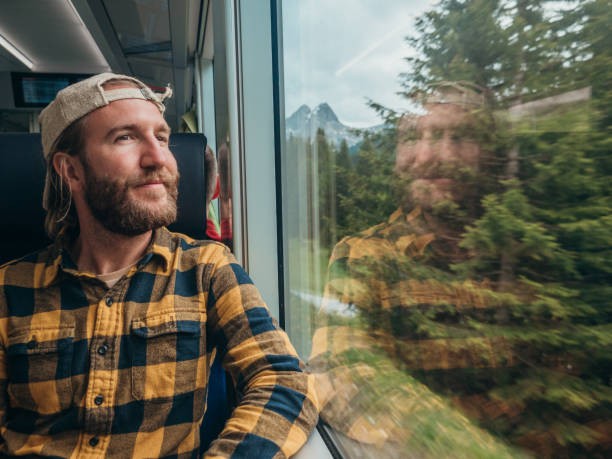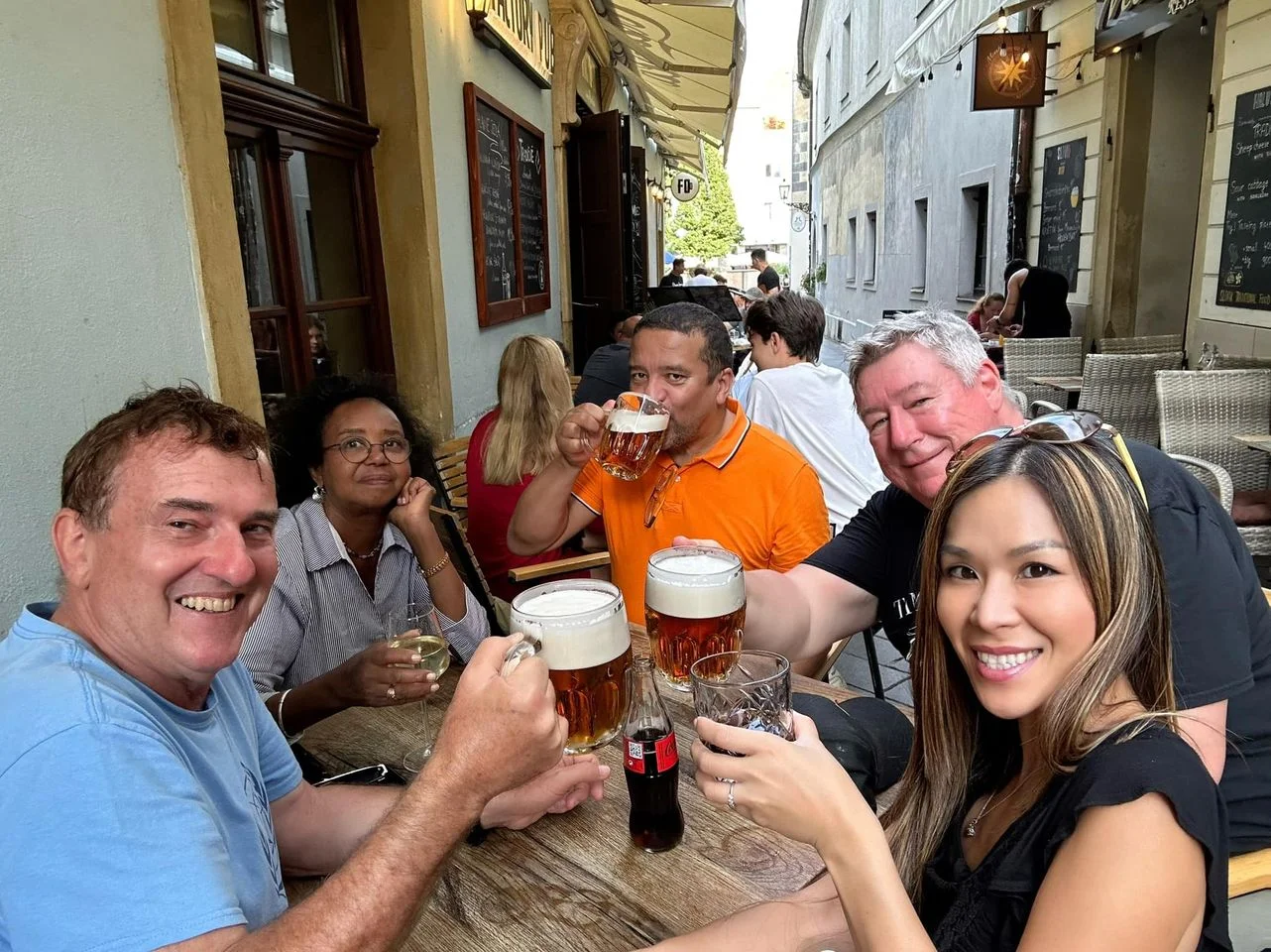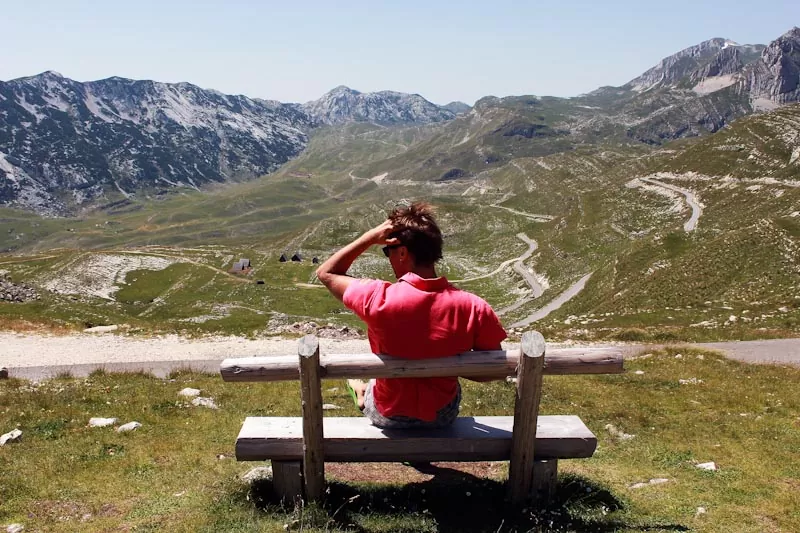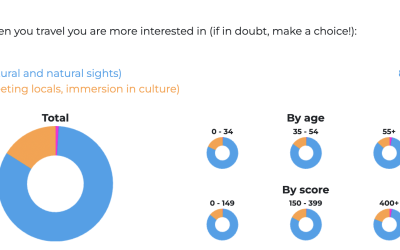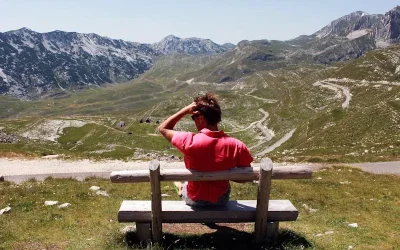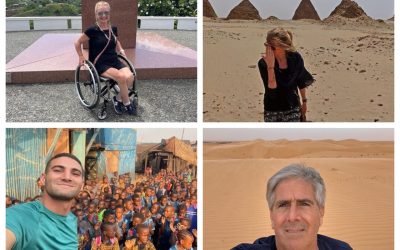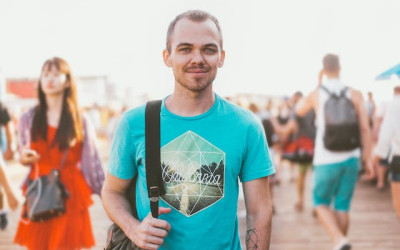Many months ago, we published our ‘travel and mental health’ questionnaire to which we received more than 1,200 responses, including extremely valuable and perceptive comments into our four questions where you were encouraged to share your thoughts.
For much of this year we have been busy building the team and making a lot of improvements to NomadMania, from new features such as our ‘Slow’ Travel list to lots of new content to our awards, so the actual analysis of these comments was side-lined.
It seemed that going through a diversity of thoughtful answers was being constantly delayed. Eventually, when we were developing a statistical analysis of the mental health questionnaire, we remembered that not everything could be quantified. Because your comments were what can’t be put into numbers.
 (See the full Mental Health Poll statistical analysis here)
(See the full Mental Health Poll statistical analysis here)
So here is the long-delayed quantitative analysis. Let’s dive into some of your most juicy answers in regard to Mental Health and Travel 🙂

PURPOSE OF TRAVELLING
QUESTION: What do you feel is your overall purpose when you are travelling?
The themes below are presented in order of frequency; every line represents one general idea in terms of the purpose of travel, so one key word has been highlighted.
- Culture was the most commonly mentioned word.
- Connecting with the locals, knowing people.
- Learning, developing oneself, thinking outside the box.
- Achievement, filling in the gaps in the map, visiting everywhere, all countries, all WHS.
- Having fun, relaxing, breaking from the routine.
Unique/niche answers as follows:
- golfing, football matches, drinking beer, helping locals, getting inspiration to write, bicycle tours, language practice, photography.
Based on the above, it would appear from your answers that the main drivers are the desire to understand cultures, to connect with people and to learn both about the world and about oneself. This is perhaps not that groundbreaking itself, but it is interesting that the idea of achievement and filling in lists was only a distant fourth in terms of what the purpose of travel is for the NomadMania community.
Here are some of the responses about the purpose of travel:
*** edited only for syntax and language:
Retired with little other purpose in life. After deciding to travel, it has become the overriding activity in my life. Curiosity about the world. Goal of reaching 193, as many NomadMania regions and series items as possible.
I like to verify the information I know from the media with reality.
My purpose is to comply with the itinerary set by myself, but it is not a problem to go out of the plan.
My purpose is a journey – not a final destination. The process of travel is much more enjoyable. Especially when it goes out of your plan.
There needs to be an objective. A business meeting, a football match, a guided gin tour, anything. Not an arbitrary ‘stroll’ through the area.
I value when I am able to create value for especially women I meet. That can be by empowering them to be more independent, or when they are entrepreneurs to improve their business idea. I like to assist fixers on how to develop their business.
I don’t think that “Point” of the travel is important, I feel more like travel itself is important.
My purpose when traveling is to visit new places where I don’t understand the language, where I don’t know the brands, and am not familiar with the culture. I simply love immersing myself into the culturally unknown and find it quite refreshing and inspiring. I also view it a bit like a puzzle trying to figure everything out when I get to a new place, with the goal of trying find things a local would do. Sometimes I meet a lot of locals that offer advice and other times I do it alone, but ironically, the results often seem to yield similar conclusions. Often times, I don’t even research a place much, I just go on my own intuition or on a fellow’s recommendation I may have heard 10 years earlier! But no matter what, once we get to know a new place, it changes our life forever. We try and seek that culture when we are back home, in a cafe or book, and especially in the news as history unfolds. Such was the case with my lucky visit to Ukraine in the summer of 2021. My, how things have changed! I would like to go everywhere, so my purpose in choosing where to go doesn’t really matter too much. It makes it easier, actually! My only issue with going everywhere is I love so much many of the places I have discovered along the way that I simply just keep going back to places I have already been. Plus, I feel it’s almost more important to visit every state in Mexico, every province in China and Thailand, every region of Italy, and every emirate in the middle east, rather than going to every country superficially. For me, getting to intimately know a place is where the real purpose lies. My only question, how many memories can our brain hold?
Making the world a more empathetic place.

HOW TRAVELLING IS CHANGING US
QUESTION: What changes have you identified in the way you relate to people and the world due to travel?
Tolerant was the most frequent word that appeared multiple times; the idea of openness and becoming less prejudiced through travel.
- Learning about oneself more, understanding oneself more.
- More confident, capable and compassionate.
- More flexible, adaptable, patient.
- Less fearful about the world.
Once again, looking at the comments, it would appear that the changes perceived from travelling were almost universally positive and generally revolved around the idea of a person becoming more tolerant and open about the world around him. We can extrapolate this idea to say that, at least if we take the NomadMania community as a reference, travel really can make a difference in how people think.
Some of the specific comments:
I realize how privileged I am. I understand that people around the world share more beliefs and lifestyle in common than there are differences.
I have learned that anyone can become my friend if I get to know them and their story. People from all over the world are way more alike than we think and fundamentally want the same things.
Traveling is postgradual study for me. And festivals are university of travelling. But on the other hand I know too much and have a different view of the world as 99% Slovaks.
Listen more than talk.
It’s forced me to improve at the basic skills required of travel, many of which have applications besides travel.
I’ve learned that if you dream about something – you should book a flight. Nothing is impossible and everything is a list of some steps. I’ve also become more open to new experiences, cultures, people of different backgrounds, traditions – in contrary to my cultural background when people perceive all new as a possible menace. I’ve become a great problem-solver. I know lots of funny stories that can help me at any situation. I’ve improved my English, learned Spanish and some Turkish. My emotional intelligence has grown dramatically and people like me more now. (editor’s note: this traveller is from Lithuania).
I no longer take many things for granted. Prosperity, financial and social security, freedom are almost a matter of course for us people from Western cultures. For many people in Africa or Central and Southeast Asia, they are not. As a result, the people there value them much more. As a European, I actually had to learn this appreciation anew. At the same time, I have learned on my travels to always see everything in the mirror of the respective cultures. What we Europeans consider good and important can have much less significance in another cultural context, and other cultures have sometimes found solutions for their coexistence that are completely different from our solutions and yet just as good.
I am what I am because of traveling. Being comfortable with most uncomfortable situations and people, experiencing ultimate goodness of human beings along with ultimate shortsightedness and egoism, meeting some of the most incredible humans of my life, some of the most epic adventures and revelations about myself, universe and the planet – that’s all thanks to traveling.
I developed my taste in architecture and urbanism.
I’ve became more self-sufficient. Travelling forced me out of my comfort zone, forced me to make decisions, to learn more about the world, to communicate with new people. I guess it made me closer to be an adult.
I found the way to be trully happy. Just need to work a little bit on it, but I know how.
At a critical age it cracked open my ‘mental colonization’ by my home country. Ever since, travel has prompted fresh questions about neo-imperialism and late-stage capitalism; questions that would otherwise have been hidden by the arrogance and ignorance perpetuated within the US.
It allows me to see what is special about my hometown and what it lacks, has given me a broader perspective to avoid the small minded habits of people where I live who like to sit on their front porch thinking of all the people who’ve wronged them.
I’m more tolerant, but also more cautious. More aware of our insignificance, but less bothered by it. And immensely grateful for what I have, and that I could have traveled all these places at all.
I started my own ethnomusic label.
I consider myself to be introverted, but our world is built around the extroverts. Through traveling, I’ve forced myself into situations and interactions that I personally found uncomfortable and come out the other side more capable and experienced. As a result, I am more able to thrive in a world not designed for me.

RELATIONSHIPS AND TRAVEL
How have your close relationships been affected by your travels?
This section has been very hard to analyse qualitatively, so it is best to give more of the travellers’ specific comments. In general, there was a split between positive and negative comments. There were somewhat more negative ones.
In terms of the positive, the ideas centered around more commonalities with significant others and sharing the joy of travel with people one is close with; strengthening relations through travel, acceptance of different travel styles and the like.
The negative comments focused on the divergence between the traveller and those around him/her who cannot understand, resulting in fewer closer relationships. Another theme was the ‘struggle’ between the desire to travel and the need to satisfy others’ expectations not to travel. Some spoke of relationship breakdowns due to travel.
Here are some of the comments:
I feel like I don’t have any close friendships and people judge me for my lifestyle which is not traditional/typical. I also feel like some of my family & friends are jealous and therefore I don’t really talk to them about my travels which is quite sad as travel is such a huge part of my life. People think I’m just on a permanent vacation and it’s rare to find someone in my life who understands that travel isn’t always a vacation and can be quite trying.
I would say my close relationships would be close with or without travel. Travel just makes the conversation more interesting sometimes….
My family would like me to stay at home, have a normal life, work, etc. I have spent long periods of my life travelling far away, and this created more distance between me and them.
Travels are rare occasions when I can spend time exclusively with my wife without a lot of interruptions that one way or another will be at home. Travels had created bright and precious memories of our family spending time together in amazing places. Positive emotions that originate from a foreign environment are inseparably intertwined with ones that originate from personal feelings and resonate strongly.
My parents and I had a tenuous relationship as I was growing up. As an only child, they smothered me with attention and protection. While I appreciate it now, it was stressful then. As soon as I could, I flew the coop. I have kept in touch with them at least once a week since then, keeping them up to date on what I am doing. By my travels, I think they now see me in a different light: more capable and level-headed than they initially thought.
We live different lives, I am bad at messaging, I am not physically there with them which creates a wider and wider distance over time.
All my relationships (family, friends) grow when I travel – people follow and support me and I feel that I revisit them more often than many friends who live in the same town or city, plus: such revisits are more “special” as it’s a “traveler’s” revisit and not a “lazy neighbor” visit. That being said, my fiancee left me after 6 years of on-and-off relationship (and many travels together) precisely because of my travel lifestyle (she felt it’s enough, I continued traveling).
Most of my close friends don’t have the opportunity to travel the way I do. We start seeing each other less often which affects the closeness of our relations. When I ask them what happened lately, they respond “Nothing”. When they ask, I respond: “Where to start?”
My parents think I’m a more capable and independent person. My friends admire me and see me as someone to look up to.
It’s hard to put all of my friends and family into a single category here. For Mom, my travel is tolerated since she did lots of traveling when she was younger. But, now that she’s older and in poor health, I think she sees travel as a competitor to spending time with her. My mother-in-law hates the fact that we are always gone during the winter holidays, and she complains about it regularly. However, my brother and brother-in-law have started traveling more adventurously. And our grown children travel nearly as much as we do. And their love of travel has influenced their friends as well. For that, we think our dedication to travel has had a positive impact.
Travelled with some friends at work who I wasn’t really close with, but over the course of travelling together became very close. Additionally, travelling with ex girlfriends has historically shown me sides to them that eventually caused us to part ways (and the opposite with my current partner, we’re closer than ever due to travel).
Travel caused my two divorces.
Travel time is no home time = not good for relationships if you don`t travel together.
I miss my family and more is that my family doesn’t understand my purpose of traveling…they call me an excessive traveler and I feel bad.
Let my credo be a sufficient commentary: “Without a woman I can live, without traveling – I die.”
I realized how close-minded many people around me were. How they are afraid of the unknown and how much they form an opinion based on media. I don’t think that just my story telling would sway them in the opposite direction but I try. For this I terminated many of my friendships. They just don’t understand and share the lifestyle. But I don’t see this negatively. As a minimalist, I prefer keeping only stuff that makes sense for me every day. So overall, I cut connections to “friends”, I relate to less people than before, but that only makes new meaningful connections that much better.
I don’t see my children very often.
Stresses from travelling, especially as a group, can bring out the nasty side of some people. and traveling with them despite and inspite of has made us understand each other better. and this in turn has made us learn to adjust to each other. travel also encouraged more conversation and more open communication.
I met my current boyfriend when I was travelling, I connected more deeply with my friends when we travelled together, we shared more memories together. The same stands for my family.
You obviously don’t meet people regularly and get out of touch with some of them. You get less time with family. Romantic relationships can profit from short-term trips/absences, but generally suffer or break from long term trips.
My son and daughter have both become well educated, well rounded, resourceful prolific travellers as a result of having spent their lives travelling with their mum and dad.
My parents are afraid I might get in trouble abroad.
Some of my family members feel like I’ve given up on them. The fact is I really can’t stand to be at home anymore (in Sweden). I feel horrible as soon as I get home and the mentality and oppressive culture there really drives me nuts.
I met my wife traveling. Most of my acquaintances too.

NEGATIVE EMOTIONS IN TRAVEL
Give examples of occasions when you felt negative, stressed and exhausted during your travels.
Overall, comparing the answers here also with the quantitative responses, it appears that the positive far outshine the negative when it comes to the travel experience. For example, few people claimed to be lonely during travel or to feel generally negative because of travel itself. This is already a very positive message to begin with.
In terms of the specific responses to negative issues relating to travel, there was quite a big range of themes identified, and here they are, more or less presented in order of frequency.
- The most frequent item was the pandemic. Covid was mentioned multiple times as a source of stress in terms of travel, with tests and multiple requirements obviously causing distress. Luckily, this is now hopefully in the past.
- Stress from delays, fear of missed connections, and other logistical/transport issues were also high on the list as was the whole process of dealing with transport.
- Too fast a pace of travel, trying to achieve too many travel goals, to see everything in limited time was also an issue causijng stress.
- Border formalities, unfriendly of corrupt officials and dealing with visas were also big stressors.
- Interestingly, travel companions and the community itself were repeatedly mentioned as stressors. Mention was made of colliding travel styles and the issue of other travellers ‘bragging’ about their achievements, which are seen as stressors by a number of respondents.
- Issues of planning could also be stressful; especially bookings in advance or having to plan activities very carefully and remember the details.
- Not feeling safe, the fear of being robbed was also mentioned but not as often as expected.
- The fear of getting ill while travelling, things like malaria or food poisoning were also a source of stress.
- Negative reactions from locals, aggression and harassment were also on the list occasionally.
- A few also mentioned issues of budget and trying to keep travelling while balancing the finances as a big stressor to them.
- In terms of groups, lack of clarity and not having enough information about a trip could also cause stress.
See the responses relating to stress during travel:
I feel most nervous when local people can’t understand even a simple word of English, but expect me to understand their language when they speak loud enough.
I’ m autistic. Too much noise and people and having no place to retreat can easily stress me out. This makes me a slow traveller. It might surprise, but I do like large cities a lot, they usually have excellent public transport and are much more accessible than nature parks or some monastery in the mountains. If Im overwhelmed in a big city, I can find a nice park or cafe or go back to the hostel. If I’m overwhelmed in an rural area, I have no choice but to somehow get back.
For me the biggest thing is feeling lonely when having a relationship and travelling without her; it has been one of the reasons for ending big relationships and that has been one of the biggest dichotomies of my life.
When I was in Umtata (South Africa) I needed to take a leak but simply no one, not even the police, would allow me to use a bathroom. I felt pretty scared as I was the only white male in the city it seemed and I could feel a lot of hostility sadly enough.
Honestly, the “one-up” attitude, competitive aspect of hardcore travelers in some of these communities is a huge turn off and quite clique-y.
I don’t get stressed when I travel, for me stress is not traveling.
I just feel I am getting old and still single and no kids… sometimes I think I should travel less and create a beautiful family.
“White” person being racially profiled as “rich” can be a pain in some poorer, less “white” countries. I come from “cannot afford to buy food or clothes”-poverty despite being born in a “rich country” and never so far made it beyond barely surviving middle class. Each trip is on a budget and I could not afford it otherwise, which brings extra negativity to the situation. Especially as it happens several times a day. On the other hand, I can understand the opportune beggars and scammers, on the other hand it is such a pain every time it happens. Racial profiling sucks every which way.
I haven’t had my own place in the last 3 years, my stuff is stored at a family members home. At first I loved it, because it made me feel free and I didn’t have to bother about subletting my apartment, when I want to travel. I spent the last three years either traveling or living for 2–3 months in a certain city/country. Now I have the feeling, that I want my own place again. Of course I will do trips from there, but I want to have a homebase again.
The only “negative” sentiment I have felt is from fellow travellers who think that I am a lesser traveller for not having been somewhere THEY think is important.
I feel that the impact of travel influencers and an increase in mass tourism has had an overall negative impact on travel and my desire to continue at times. Specifically the need to plan further ahead (eg. booking tickets to a museum/site with specific dates/times), often weeks in advance seriously detracts from the enjoyment to be had in flexible travel. I also feel that various government/municipality fees for many places are starting to feel like gouging and just taking advantage of people. I have adapted where and how I travel and find myself avoiding more places/activities as a result in order to continue enjoying to travel.
I have expressed some frustration while traveling in Europe with my autistic son. It is a challenge for us to travel and he is amazing given his disability. On rare occasion, he gets upset and may act out. Nothing outrageous but you can imagine. Last summer, we experienced rude and judgmental people while taking the train through Europe. It seemed like some in Austria and that area didn’t want any children on the train to begin with even though we were in the family car. When he was yelling for a while, some passengers made rude comments and were not at all compassionate with us. However, they made no such comments when a group of drunk men got on the train and were loud the entire time, even singing songs etc. We are used to more friendly people in the US. Primarily people in the US seem to be more compassionate with those that have special needs.
Having a weak passport is such a mental and physical hurdle. It is sometimes a big turnoff to traveling and it does take the fun out of traveling and sometimes just “winging it”
There’s so much to this answer. One exhausting thing is getting ahead of ourselves in our travels, like planning too far in advance, and trying to squeeze too much in our schedule. We usually end up loving most the places where we spend the most time, so it’s better to get to know a place rather than try and churn out numbers on a website or paper. Yet other times, we do have a plan and goal, and when energy wanes and I am tired, and don’t want to push on, I think to myself. “Look, you can do it, and you won’t regret it when you are back home.” I ask myself and other when trying to motivate, “Have you ever regretting going on a trip somewhere?” If we don’t die or get severely injured, the answer is always, “Never a regret; what a rewarding and mind-opening experience.” One cure for the exhaustion and stress, is the important advice many have told me: Be here now To this point, I have realized: We often don’t know how much fun we are actually having when we are having it. It is in the memories where we can say, “Oh that was so much fun!” But now, when I am having fun, I try and take a step back in the moment, look around, and say to myself and to others, “Hey, we are having fun now!”
I only feel stressed when I have to go home!

CONCLUSIONS
There is a lot to learn from your comments. While some of you have experienced negative effects to your relationships, it appears that you are willing to pay the price for the joys that travel brings. And these joys are multifold – both in terms of positive personal change and in terms of achieving a positive purpose.
While there are inevitably a varied number of stressors when travelling, many of you were quick to stress that these were not all that significant compared to the overall good of travelling; and there were very few comments suggesting that travel overall was a negative thing or a problem itself.
So, the verdict is out: overall, travel makes us happy, leads us to self-knowledge and is ultimately a really good thing! Here’s to a travel-filled 2024!


